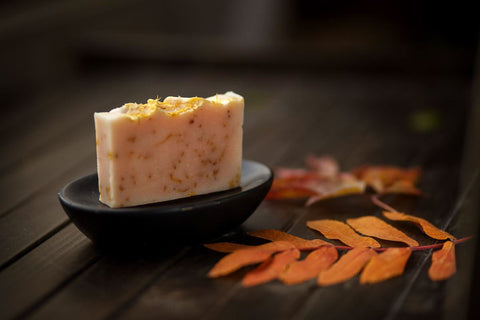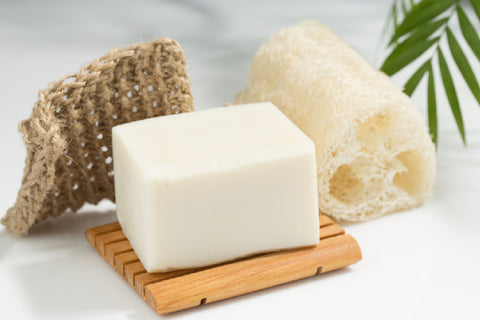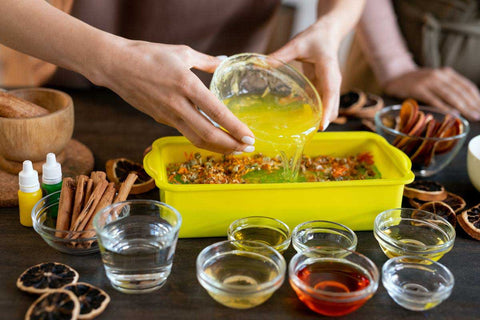How To Make Vegan Soap at Home
Vegan soap is a type of soap made from plant-based ingredients, without any animal-derived ingredients. It is an excellent choice for those who follow a vegan lifestyle or have sensitive skin. Vegan soap does not contain harsh chemicals, artificial fragrances, or synthetic preservatives that can irritate or dry out the skin.

Instead, it is often enriched with natural oils and butter, providing deep hydration to the skin. Vegan soap is hypoallergenic and less likely to cause allergic reactions. It is also environmentally friendly, cruelty-free, and packaged in recyclable materials, making it a sustainable choice. Using vegan soap can keep your skin healthy, soft, and nourished while supporting ethical and environmental values.
How is Vegan Soap Different from Traditional Soap?
Vegan soap contains no animal-derived ingredients and is made using plant-based ingredients like oils, butter, and essential oils. Using plant-based ingredients makes vegan soap more sustainable and eco-friendly than traditional soap, which can contain animal fats or oils. Vegan soap is also often packaged in environment-friendly, recyclable materials.
Vegan soap is also beneficial for the skin as it is hypoallergenic. It is often enriched with natural oils and butter that provide deep hydration without harsh chemicals or synthetic fragrances. In contrast, traditional soap can contain harsh chemicals that can strip the skin of its natural oils, leading to dryness and irritation.

Using vegan soap is a way to support ethical and cruelty-free practices, as it is not tested on animals and does not harm the environment, unlike traditional soap production. Overall, while traditional soap has been a popular choice for many years, the rise of vegan soap offers a more sustainable and ethical option.
DIY Vegan Soap Recipe - Step By Step
Vegan soap is eco-friendly, hypoallergenic, enriched with natural oils, and does not contain harsh chemicals or synthetic fragrances. It is also cruelty-free and supports ethical practices. It is also easy to make at home by following the following DIY steps for a vegan soap recipe-
Ingredients:
- Water - 350ml
- Shea Butter - 250 GM
- Virgin Coconut Oil - 500 GM
- Virgin Olive Oil - 500 GM
- Sodium Hydroxide (lye) - 150 GM
- Vanilla Essential Oil - 1 Tablespoon
Equipment:
- Digital kitchen scale
- Immersion blender
- Thermometer
- Soap moulds
- Stainless steel or enamel pot
- Heat-resistant plastic or silicone spoon
Directions:
Step 1: Weigh the coconut oil, olive oil, and shea butter in a stainless steel or enamel pot. Heat the mixture on low heat until the oils are melted.

Step 2: In a separate container, carefully mix the sodium hydroxide with the water. Wear gloves and protective eyewear, as this mixture can be dangerous.
Step 3: When the oil and sodium hydroxide mixture has cooled to around 100-110°F, carefully pour the sodium hydroxide mixture into the oil mixture, stirring with a heat-resistant plastic or silicone spoon.
Step 4: It is Use an immersion blender to mix the ingredients until the mixture thickens and reaches a "trace," when the mixture leaves a trail behind the blender.
Step 5: Add any essential oils or fragrances at this point, and stir well. Pour the mixture into soap moulds and let it sit for 24-48 hours until it hardens.
Carefully remove the soap from the moulds and cut it into bars. Let the bars cure for 4-6 weeks in a cool, dry place before using them. This simple recipe can be customized with different essential oils or fragrances to suit your preferences. Homemade soap is a fun and rewarding way to create eco-friendly, cruelty-free soap that is gentle on your skin.
Here are some of the precautions and measure to be taken while following the vegan soap recipe-

- Safety Gear: Wear protective gear such as gloves, goggles, and a long-sleeved shirt to avoid contact with lye, a caustic substance that can cause burns.
- Mixing Order: Always add lye to water, never the other way around. It can cause a violent chemical reaction when mixed in the wrong order.
- Mixing Utensils: Use only heat-resistant plastic or silicone spoons to stir the soap mixture. Avoid using aluminium or other reactive metal utensils.
- Ventilation: Work in a well-ventilated area or use a mask to avoid inhaling fumes from the lye mixture.
- Accurate Measurements: Use a digital kitchen scale to measure all ingredients accurately. Incorrect measurements can affect the quality of the soap.
- Patience: Follow the curing time recommended for your recipe. Rushing the curing process can result in poor-quality soap that is soft and prone to breaking.
Conclusion
It is Making vegan soap at home is a fun and rewarding activity, but it is important to take proper precautions to ensure safety and quality. This simple recipe uses natural ingredients such as coconut oil, olive oil, and shea butter to create a gentle, eco-friendly soap.
Remember to wear protective gear, mix the ingredients in the correct order, and follow the recommended curing time. With these precautions in mind, making your vegan soap can be a satisfying and enjoyable experience.
Frequently Asked Questions
Welcome to our FAQ section on vegan soap recipes! Here, we aim to provide answers to some commonly asked questions about making vegan soap. We hope to offer helpful information to enhance your soap-making journey.

Q1. What makes vegan soap different from traditional soap?
Ans: Vegan soap is free of animal-derived ingredients such as milk, and honey, instead uses plant-based ingredients such as coconut oil or shea butter, unlike traditional soap.
Q2. Can I add essential oils to my vegan soap recipe?
Ans: Yes, adding essential oils is a great way to add a pleasant scent to your vegan soap. However, make sure to use skin-safe essential oils and avoid adding too much.
Q3. How long does it take for vegan soap to cure?
Ans: It usually takes 4-6 weeks for vegan soap to cure properly. During this time, the soap hardens and the pH level stabilizes, resulting in a longer-lasting and gentler soap.
Q4. Can I use any kind of mold for my vegan soap?
Ans: You can use silicone or plastic molds that are specifically designed for soap-making. Avoid using metal or glass molds as they can react with the soap mixture and affect the final product.
Q5. Is vegan soap good for sensitive skin?
Ans: Yes, vegan soap is often hypoallergenic and free of harsh chemicals that can irritate sensitive skin. It is also enriched with natural oils and nourishing ingredients that are good for all skin types.
You May Also Like
Buy Products
Related Articles
Disclaimer :- This article is intended for informational and educational purposes only and should not be considered a substitute for professional medical advice. For specific health concerns or treatment, please consult your personal physician. The article's editor, writer, and VedaOils organization do not assume any responsibility for any health outcomes resulting from the information provided. Readers are strongly encouraged to seek advice from their physician before acting on any recommendations made in these articles.

















 Sign in
Sign in Register now
Register now My Reward Points
My Reward Points









